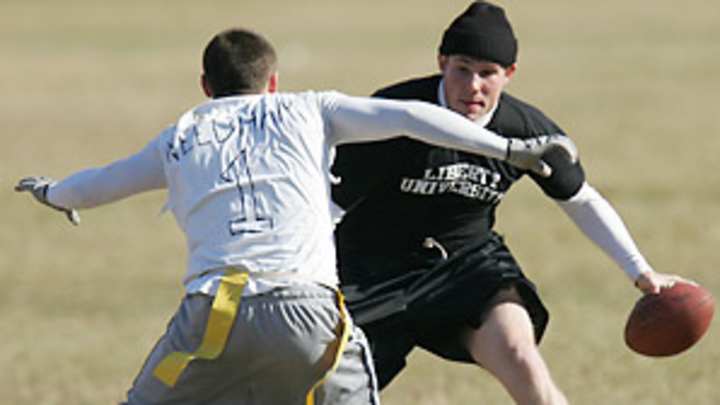Flagging a title

1. The QBIt's obvious. Good quarterbacks win games. So avoid the temptation of offering your pal the starting spot just because he's a decent athlete. Hold out for better. Try shopping around a little. In most flag football leagues (with a live rush or without), talented quarterbacks are a premium. If you can, find someone who has played the position in a competitive setting before. The importance of poise and confidence in the pocket cannot be overstated. Smart decisions and good instincts will win games when combined with a strong arm.
2. The Short GameThe long ball tempts too many flag football teams. For some weekend warrior quarterbacks, the visions of glory are overpowering. The long ball has its place, but in most cases, launching the ball too often will lead to turnovers, and in a 40-60 minute game, turnovers are devastating. Quick completions do three things. First, short plays pick up yardage and allow you to march down the field in rapid fashion. Secondly, short plays open up the field for the long ball, so if you complete a couple short passes you can then look over the top with the stop-and-go. Finally, a series of short, chain-moving completions will demoralize your opponent.
3. Blockers and RushersOne of the biggest mistakes a team can make (in a league with live blocking) is putting the wrong guys on the line. The line is no place for the "leftovers." It's not even the place for your 300-pound elephantine friend who hasn't moved faster than a walk since third grade. Offensive and defensive linemen are skill positions. If you're fortunate enough to have huge, muscle-bound, athletic friends who run 4.7 40's and have arms the size of your thighs, by all means put them on the line. But don't overlook the quick, feisty guy who won't stop talking or the lanky guy who simply can't be contained. On offense, if you can give your QB time, it will absolutely transform your game. The opposite is true on defense -- With enough pressure on the opposing quarterback, you can lay waste to his passing game. Build your team around the line.
4. Playbook SystemDon't be fooled into thinking you can be competitive by scraping together a couple of good athletes and then going out to play sand-lot football. That might work in the Recreational C League, but not against last year's champs. Just because it doesn't have to be organized football doesn't mean it can't be. A championship team has strategy. Spend some serious time crafting a system that plays to your strengths. If you're short on time or if you simply can't cut it as an offensive coordinator, find a playbook that works. FlagFootballNinja.com is a sharp-looking site that sells a bunch of playbook packages. Remember, if you're trophy-bound, saying "just get open" or drawing routes on your chest in the huddle won't cut it.
5. Goal Line ProductivityDon't ignore the short-yardage plays. We see it at all levels of football. A team marches down the field to the three-yard line and then after four tries just can't put the ball in the end zone. Or, after a great touchdown, the offense can't seal the deal with an extra point. In flag football, it's the little things that make the difference. Most games only last a few possessions per half, so missing an extra point, or worse, a red zone opportunity, will kill your productivity. Practice the short game. Find something that works. It's not as sexy as throwing the deep routes, but spend time honing the short game and it will make a huge difference when you're on the goaline and need to put the ball in the end zone.
6. PreparationMost flag football teams show up for the game, play and then go home. Two practices a week beginning a month before the season starts is ideal, but unrealistic for most teams. At the very least, you need to show up between 30-60 minutes before game time. Let your QB warm up the arm and get the team to loosen up and stretch. This will help prevent injury and significantly improve your play. It's important to use pre-game time to go over your offense and defense, too. If you have a lineup, now's the time to get people thinking about their positions. Passing lines and repetition will tighten your routes and lead to higher completion percentages. You will be hard-pressed to find a defense that can stop a perfectly timed out-route or 5-yard hitch. Practice and preparedness are the only way to develop this kind of timing, but once you've got it, look out.
7. DefenseIt doesn't get more basic than this. Yet somehow, when it comes to flag football, way too many teams leave their defense to sort itself out. Spend time on your defensive scheme. Your team should spend almost as much time in warm-ups walking through defense as it does offense. Team size will often dictate whether you play man or zone (in four-on-four it's very difficult to play an effective zone defense, but consider a hybrid. Do you have a stand-out corner you can lock down on the weak side? If you have the athletes for it, a true man defense can be tough to beat. Either way, check out the Ninja for some ideas and schemes.
Avoid these pitfalls and you will be well on your way to a championship. But remember, tips and advice mean little without heart and desire.
